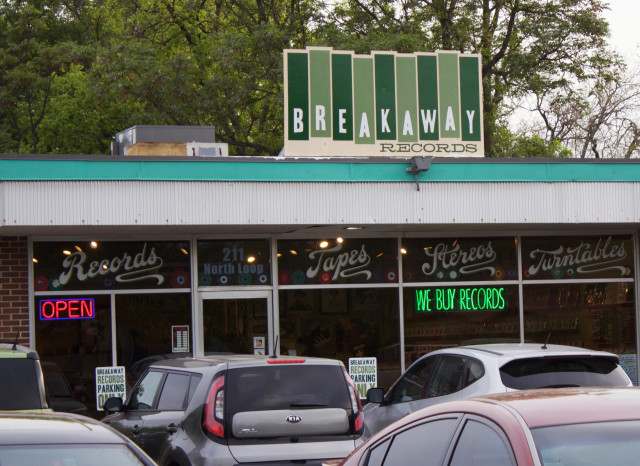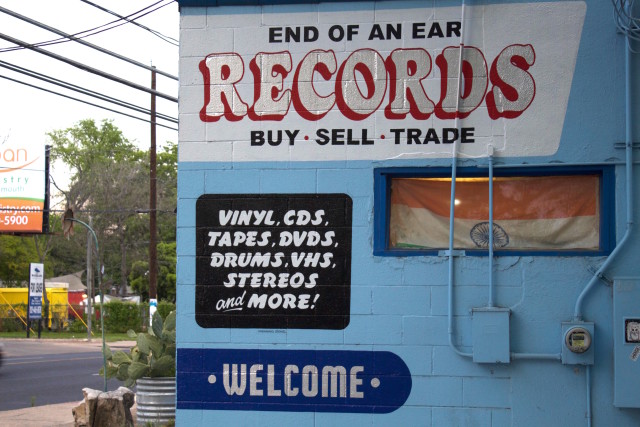Austin Record Stores Thrive with National Vinyl Resurgence
By Aaron Schnautz
Reporting Texas

Breakaway Records moved to North Loop Boulevard after outgrowing its previous location on Austin’s East Side. Aaron Schnautz/Reporting Texas
Give Adele credit for her part in leading the vinyl record revolution. The British pop singer released her second album, “25,” in November, and it sold more records in the last six weeks of 2015 than any other vinyl record sold in a calendar year since 1991, when Nielsen SoundScan began tracking U.S. sales.
Although other audio formats seem to be losing steam – Nielsen reported sales declines last year for CDs and digital audio – vinyl continues to gain popularity. That has been music to the ears of Austin record store owners, who have seen their businesses flourish as vinyl sales continue to rise.
“The vinyl resurgence is not a hipster flash in the pan. It’s for real,” said Marc Campbell, owner of The Sound Gallery on South Congress Avenue. With a showroom full of quality turntables and its own espresso bar, his vintage audio store is one of 10 throughout the city.
Nielsen reported that 2015 was the 10th consecutive year vinyl sales have increased, with nearly 12 million records sold. It’s a far cry from the peak of 334 million records sold in 1977, but a decade of progress is promising. And although digital music subscription services such as TIDAL and Apple Music earned more than $1.2 billion in revenue last year, the Recording Industry Association of America (RIAA) reported that vinyl records brought in more revenue ($416 million) than ad-supported streaming music services such as Spotify and YouTube ($385 million).
“We are doing more than three times the amount of business we were doing in 2011,” said Dan Plunkett, co-owner of End of an Ear Records since the store opened 11 years ago.
It’s hard to miss his store on South First Street — a sky-blue building with a cluster of cacti out front. Inside, the walls are lined with album covers, with a focus on local artists and unique genres, as well as a selection of CDs and DVDs. A small corner of the building serves as a makeshift stage for in-store performances, as it did for Texas rock band Explosions in the Sky on April 1.

End of an Ear Records has been meeting the needs of South Austin vinyl aficionados since 2005. Aaron Schnautz/Reporting Texas
It’s not just baby boomers who grew up with records who are driving the vinyl revolution. Josh LaRue, co-owner of the all-vinyl Breakaway Records, said the coveted millennial demographic is showing strong interest in records as well.
“What we’ve seen is a whole group of younger people who have been listening to music in almost exclusively a digital format,” LaRue said. “And to that demographic there’s something about the tangible object of holding a record in your hand. It’s a more emotional and immediate way to interact with music.”
Campbell said some of his best customers happen to be teenage girls. While people old and young still go into stores to find a copy of Pink Floyd’s “Dark Side of the Moon” or “Abbey Road” from The Beatles, those albums were topped in last year’s sales chart by Adele and Taylor Swift (“1989”) – two pop stars with plenty of teenage female fans.
Talk to anyone who has listened to a record spin on a turntable, from those who were alive during the early days of the vinyl surge in the 1940s to the teenage girls who frequent The Sound Gallery today, and they will mention the noticeable difference in sound quality compared to an MP3 file.
“Vinyl records are a form of rebellion against the soullessness of the digital age,” Campbell said.
Austin record store owners have their worries, though. As the city grows, rent prices keep rising. With his store’s lease facing renewal this summer, LaRue wonders if he might get priced out of his location on North Loop Boulevard.
“Rents are getting out of hand as Austin keeps growing,” he said.
In addition, national retailers such as Amazon, eBay and Urban Outfitters have become competitors. The Internet makes it easy to build a record collection without ever setting foot in a brick-and-mortar store, and national retailers’ market power can prevent independent stores from getting enough copies of the newest and most popular pressings to keep up with demand. Nielsen reported that 45 percent of record sales in 2015 came from independent stores.
However, for those who appreciate the physical aspect of vinyl, there’s something cathartic about searching through rows and rows of used records until one catches the eye. That’s an experience online retailers can’t reproduce.
“I consider Amazon to be a predator,” Campbell said. “But the one thing that Amazon can’t destroy is the human interaction that takes place in a record store. At The Sound Gallery, we spend hours talking with our customers about stereo gear and music. Record stores and video stores have always been the universities of pop culture. Amazon doesn’t offer that kind of heart and soul.”
LaRue believes national retailers actually strengthen the vinyl community. Amazon and others make it relatively simple and inexpensive to buy a turntable and a handful of records, thus initiating a love for vinyl that can be fostered in local record stores.
“Retailers like Amazon and eBay are helping to spread general awareness, so now more people know about and are talking about vinyl records,” he said. “Yes, it might be taking away a sale from us, but at the same time the general awareness isn’t a bad thing for us.”
Not every Austin record store has thrived along with the vinyl resurgence. Encore Records closed at the end of 2011 before reopening at a new location on East Sixth Street 11 months later. MusicMania struggled to compete with digital sales, closing for good on Halloween 2013. Trailer Space Records followed suit exactly two years later, a victim of the expansion plans of neighboring East Side Pies.
April 16 is Record Store Day, a national celebration started nine years ago to bring together store owners, employees, customers and musicians. It’s one of the busiest days of the year for record stores.
“We’ll have some DJs playing, some stuff like that,” LaRue said. “But it’s hard to do much else, it’s such a crowded day.”
For Campbell, it’s just another day: “At The Sound Gallery, every day is Record Store Day.”